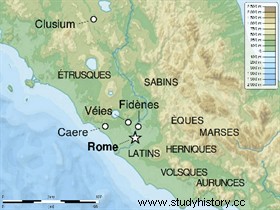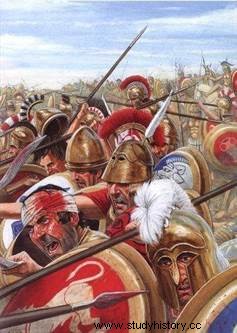 It is the epic and tragic story of a family hated then adored by the Romans, always victorious and finally exterminated on the battlefield during the battle of Crémère where 306 Fabii distinguished themselves in a vain but heroic defense … An atypical story that Livy chronicled like Dionysius of Halicarnassus.
It is the epic and tragic story of a family hated then adored by the Romans, always victorious and finally exterminated on the battlefield during the battle of Crémère where 306 Fabii distinguished themselves in a vain but heroic defense … An atypical story that Livy chronicled like Dionysius of Halicarnassus.
The Fabii
The Gens Fabii is one of the largest families in Rome, but also one of the most ephemeral since it disappeared from consular splendor (chronological list of consuls) from the beginning of Empire, in the year 34. But from the 4th century to this date it offered Rome no less than 6 dictators (extraordinary magistrate holding all the powers), 46 consuls (magistrate holding the supreme civil-military power for one year), 6 censors (former consuls in charge of the census), 6 masters of cavalry (honorary title), 14 consular tribunes (supreme magistrates in the 5th and beginning of the 4th century) and 2 decemvirates (religious office)!
The Fabii claimed descent from Hercules through a daughter of Evandre. Evander is a mythological hero of the origins of Rome, an Arcadian who came to settle on the Palatine Hill bringing agriculture and writing. Admiring his great wisdom, the locals would have welcomed him as a god and took him for king. Hercules was once his guest, and Evander, warned by a prophecy that Hercules would be deified, was the first to worship him during his lifetime. It is therefore from the union of Hercules and the daughter of this other mythological hero that the Fabii were born. It should be noted that the Fabii remain marked by their name in agriculture, prerogative of Evandre. Indeed the name of Fabii refers to broad beans, whose culture would have been brought to Rome by this family, protecting it a little from famine.
The first historically known Fabii is Fabius Vibulanus, a Roman noble from the 6th century, possibly of Etruscan origin, father of Quintus (twice consul), of Marcus (2 times consul) and Kaeso (3 times consul).
The three consul brothers
 In 485 BC. J.-C. Quintus is elected consul, he wins military victories against the Volscians (Italic people living in the marshes in the South of Latium) and the Eques (Italic people of the North-East of Latium). He then decides to sell the loot and pay the profits back to the public treasury... A very bad choice in terms of his popularity with the soldiers who thus find themselves deprived of sharing the loot... But this is perhaps what allows to his brother Kaeso to be elected consul following him with the support of the patricians.
In 485 BC. J.-C. Quintus is elected consul, he wins military victories against the Volscians (Italic people living in the marshes in the South of Latium) and the Eques (Italic people of the North-East of Latium). He then decides to sell the loot and pay the profits back to the public treasury... A very bad choice in terms of his popularity with the soldiers who thus find themselves deprived of sharing the loot... But this is perhaps what allows to his brother Kaeso to be elected consul following him with the support of the patricians.
However, the election of a second Fabii does not particularly please the Roman people, some civil unrest breaks out:the Volscians and the Aequi take advantage of this to recover. until the second consul, Lucius Aemilius Mamercinus, went and defeated them. As if not to appear to yield to the pressure of the people, the patricians managed to have another Fabii elected for the following year (483), the third brother, Marcus, consul with Lucius Valerius Potitus Publicola (even more hated by the people, but for other reasons). Marcus and his crony face a tense year, rejecting land laws and dealing with the dire omens that herald war (to appease the gods, a vestal virgin is buried alive).
The following year Quintus was re-elected consul as the war against the Eques and the Veians resumed. Kaeso, re-elected consul the following year (481) was given the task of repelling the enemies of Rome:he encountered some difficulties in mobilizing the citizens who intended to assert their rights against the patricians, he nevertheless succeeded in doing so with the help of tribunes of the plebs and leaves to fight the Aeques while his fellow consul leaves to make a sham campaign against the Veians.
Kaeso wins a victory over the Eques! Crushing, but not decisive since his infantry refuses to pursue the fugitives... Once again a Fabii returns to Rome victorious, but hated by his soldiers. The following year (480) Marcus resumed the consulship, still opposed to agrarian laws. Despite the animosity of the people, and thanks to a few tribunes, he still manages to mobilize soldiers to face the many threats hanging over Rome. The Veians launch a great offensive and the consuls dare not leave their camps, so afraid are they of the mutinies of their own troops.
Marcus ends up making his soldiers swear victory before launching into a counterattack during which his brother Quintus perishes. Marcus and Kaeso continue the victorious counterattack, repelling the Veians before swooping down on a few enemies who had managed to reach the Roman camps and kill the second consul Cnaeus Manlius Cincinatus. On his return Marcus is acclaimed as a hero in Rome saved, the Senate offers him the triumph, but he refuses, because the death of his brother and Cincinatus gives this victory a bitter taste. He collects with his family many wounded soldiers, this behavior radically changes the image of the Fabii with the people who see in Marcus a victorious and good consul. His brother Kaeso was elected consul for the third time the following year (479):he accentuated the reversal of popularity of the Fabii with the people by accepting the agrarian laws which allowed the distribution of land to soldiers rather than to the ager publicus which benefits the patricians. However, he must still and always face the wars of the Aeques and the Veians which exhaust Rome.
The Fabii Oath
The Senate struggled to maintain forts to protect Rome, the treasury was depleted, and the citizens balked at this kind of armed service. In this year 479, Kaeso consul, his brother Marcus and all of the 306 Fabii take an oath:that of fighting alone, with their clients (around 4,000), the Veians. This decision is intended to relieve Rome of this front that has been wearing out for years. This dedication continues to raise the popularity of the Fabii with the people, however some rightly wonder if this action was motivated by the interests of Rome or to monopolize the spoils won during this campaign. Others have also thought that the Fabii had preferred to flee the social turmoil of Rome to found their own establishment. Be that as it may, the Fabii go up the Crémère River for about ten kilometers and fortify themselves.
Rome is beset by its Italian neighbors. Among the great Roman families, the Fabii will monopolize the consulates and repel the enemies of the city one by one. But in -477, faced with the Senate's difficulties in financing the defence, the Fabii took the oath to defend the city of seven hills alone against the powerful Etruscan city of Veii.
In 478 the Veians combine with other Etruscans to crush the fort of the 306 Fabians. During the battle, the consul Mamercinus intervenes and his cavalry routs the enemy who implores peace. Retaking the initiative, the Fabii embark on a series of skirmishes, ambushes, but also pitched battles on Veian territory and make life difficult for the Etruscans around the city of Veii. The Fabii fly from victory to victory, notably seizing the cattle of their enemies. Fighting more and more in enemy territory, and not in their entrenched camp, they ended up falling into a trap in 477. During the battle known as the "Battle of Crémère", the Fabii, dispersed and too busy seizing a herd arranged here to attract them, are attacked from all sides by the Veians.
Surrounded, cornered, the Fabii attempt a heroic exit and open a path with their swords to a small hill where, concentrating their forces, they manage for a time to repel the tumultuous assaults of the attackers. But a body of Véiens suddenly arises on their backs and the last Fabii perish the weapons in the hand… None escapes from it and it was necessary little that all Fabia gens disappears on this hill. Of the Fabii there remains only the son of Marcus, Quintus, who due to his young age had not been able to participate in the incredible expedition (it is also possible that there were other children not mentioned, but who did not reach adulthood). He will himself be three times consul then decemvir and will ensure the lineage of the Fabii for the next five centuries...
Bibliography
- Livy, Roman History, Book II, 49-50.
- Dionysius of Halicarnassus, Roman Antiquities.

